人教版高中英语必修三高一下学期期中考试英语试题 (3).docx
人教版高中英语必修三高一第二学期期中考试

高中英语学习材料(灿若寒星*制作整理)广东省江门市开平市风采华侨中学2010-2011学年度高一第二学期期中考试(必修3)Ⅰ. 单词拼写(共10小题;1分/题,满分10分)1.He has great ________(信任)in his doctor.2.I really ________(钦佩)people who can work in such difficult conditions.3.You should ________(道歉)to your mother for what you have done.4.We must ________(限制)our spending.5.She ________(凝视)at him in surprise.6.They ________(寻求)a place for drinking at last.7.He is going to ________(搜集)materials for a new book.8.We can’t always ________(结合)work with pleasure.9.She ________(获得)much work experience when she was in London.10.We must keep the ________(平衡)of the nature.Ⅱ. 翻译短语(共10小题;0.5分/题,满分5分)11. 抚养;培养________________________ 12. 偶然;无意中_________________________13. 谋生______________________________ 14. 纪念;追念__________________________15. 出现;到场_________________________ 16. 与此相反;正相反____________________17. 使……想起…… _____________________ 18. 说谎________________________________19. 期望;期待;盼望___________________ 20. 守信用;履行诺言___________________Ⅲ. 翻译句子(共5小题;2分/题,满分10分)21. 你认为我们应该什么时候出发?_______________________________________________________________________________ 22. 这个庆典通常是什么时候举行的?_______________________________________________________________________________ 23. 你能屏气多长时间呢?_______________________________________________________________________________ 24. 他在运动竞赛中获得了什么奖品?_______________________________________________________________________________ 25. 你能准许我们今天下午在这个房间开个会吗?_______________________________________________________________________________ Ⅳ. 语言知识及应用(共两节,满分45分)第一节完型填空(共15小题;每小题2分,满分30分)In Britain, people have different attitudes to the police. Most people generally 26 them and the job they do—although there are certain people who do not believe that the police should have the power that they do.What does a policeman actually do? It is not 27 job to describe. After all, a policeman has a number of jobs in one .A policeman often has to control traffic, either 28 foot in the centre of a town, or in a police car on the roads. Indeed, in Britain, he might be in the Traffic Police and spend all, or a lot of, his time driving up and down main roads and motorways. A traffic policeman has to help keep the traffic moving, stop 29 motorists(骑摩托车的人) andhelp when there is an accident.A policeman has to help keep the 30 , too. If there is a fight or some other disturbance (骚乱),we expect the police to come and restore(恢复)order. And they often have to 31 situation at great risk to their own 32 .We expect the police to solve crimes, of course, so an ordinary policeman, 33 he is not a detective(侦探), will often have to help 34 and arrest criminals.And 35 do we call when there is an emergency(紧急情况)—an air crash, a 36 ,a road accident, or a robbery? We call the police. 37 a policeman has to be 38 to face any unpleasant emergency that may happen in the modern world.The police do an absolutely necessary job, they do it 39 well and I support them, but I do not envy policemen. I do not think that I could 40 do the job of a policeman.26. A. dislike B. appreciate C. join D. admire27. A. a funny B. a pleasant C. an interesting D. an easy28.A. on B. by C. under D. with29. A. resting B. tired C. speeding D. sleepy30. A. peace B. silence C. situation D. condition31. A. turn to B. avoid C. deal with D. treat32. A. safety B. families C. future D. friends33. A. but B. as if C. however D. even if34. A. get rid of B. look for C. question D. sentence35. A. how B. where C. what D. who36. A. power failure B. fire C. thunder storm D. thief37. A. Yet B. Then C. As D. So38. A. provided B. promised C. prepared D. presented39. A. extremely B. specially C. surprisingly D. particularly40. A. hardly B. ever C. forever D. never第二节语法填空(共10小题;每小题1.5分,满分15分)阅读下面短文,按照句子结构的语法性和上下文连贯的要求,在空格处填入一个适当的词或使用括号中词语的正确形式填空,并将答案填写在答题卡标号为41 ~ 50的相应位置上。
人教版高中英语必修三高一下期期中英语试题.docx
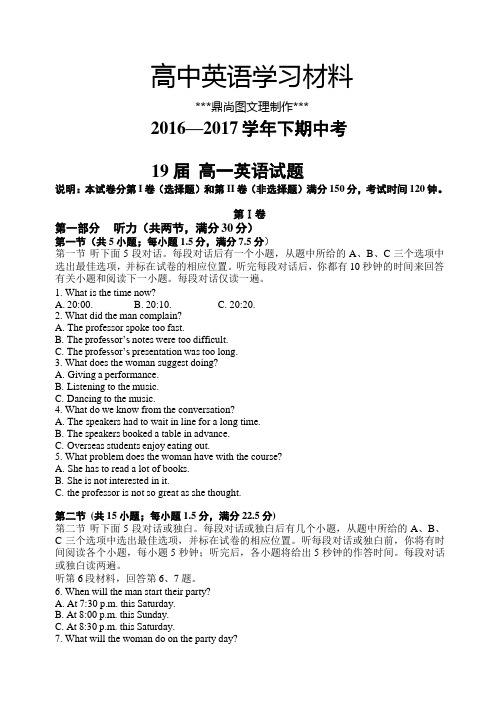
高中英语学习材料***鼎尚图文理制作***2016—2017 学年下期中考19 届高一英语试题说明:本试卷分第I 卷(选择题)和第II 卷(非选择题)满分150 分,考试时间120 钟。
第Ⅰ卷第一部分听力(共两节,满分30 分)第一节(共5 小题;每小题1.5 分,满分7.5 分)第一节听下面5 段对话。
每段对话后有一个小题,从题中所给的A、B、C 三个选项中选出最佳选项,并标在试卷的相应位置。
听完每段对话后,你都有10 秒钟的时间来回答有关小题和阅读下一小题。
每段对话仅读一遍。
1.What is the time now?A. 20:00.B. 20:10.C. 20:20.2.What did the man complain?A.The professor spoke too fast.B.The professor’s notes were too difficult.C.The professor’s presentation was too long.3.What does the woman suggest doing?A.Giving a performance.B.Listening to the music.C.Dancing to the music.4.What do we know from the conversation?A.The speakers had to wait in line for a long time.B.The speakers booked a table in advance.C.Overseas students enjoy eating out.5.What problem does the woman have with the course?A.She has to read a lot of books.B.She is not interested in it.C.the professor is not so great as she thought.第二节(共15 小题;每小题1.5 分,满分22.5 分)第二节听下面5 段对话或独白。
人教版高中英语必修三第二学期高一年级期中考试.doc

人教版高中英语必修三第二学期高一年级期中考试肥西农兴中学2010~2011学年第二学期高一年级期中考试英语试卷注意事项:1、本试卷满分120分,考试时间100分钟。
2、第1~8页为试卷,第9~10页为答题卷。
3、请考生在答题卷规定的位置填写班级、姓名和考号,交卷时只交答题卷。
第I卷(选择题,共85分)I. 单项选择(共15 小题,计分15 分)1._________ the new policy, we are now havinga happy life.A. Thanks toB. BecauseC. ForD. Thanks for2. She was________ for helping the murderer to escape.A. searchedB. broughtC. arrestedD. caught3. We _______on it for several hours but we haven’t yet reached any conclusion.A. are workingB. workC. have been workedD. have been working4. It’s no use ______Bill because he will never change his mind.A. argueB. argue withC. arguingD. arguing with5. —When could you have a meal with me? —I’d like to go whenever it is _______to you.A. fitB. niceC. convenientD. suit6. The flu is believed ________by viruses that like to reproduce in the cells inside the human nose and throat.A. causingB. being causedC. to be causedD. to have caused7. I am __________ with living with a man of this kind.A. eat upB. eaten upC. feed upD. fed up8. We have learned 2, 000 English words__________.A. by farB. so farC.too far D. as far9. He was a heavy smoker before. His wife _______him not to smoke because of his illness.A. advisedB. suggestedC. forcedD. persuaded10. Mother received a letter from her son, telling that he had __________the money and food.A. run out ofB. ran out ofC. run outD. ran out11. Car production rose 25% _________the first three months of this year.A. comparing toB. compared toC. compare withD. to compare with12. The cost of living in Glasgow is among the lowest in Britain, _________the quality of life is probably one of the highest.A. sinceB. whenC. asD. while13. —What about the style of the coat?—It ________you very well.A. fitsB. suitsC. satisfiesD. gets14. Who else except a millionaire could _______to use such an expensive car.A. payB. spendC. buyD. afford15. —What took you so long?—I got lost. I have no _________of direction. A. sense B. ability C. knowledge D. feelingII.完形填空(共20小题:每小题1.5分,共30分)阅读下面短文,掌握其大意,从每题所给的A、B、C、D四个选项中,选出最佳选项。
人教版高中英语必修三第二学期高一年级期中考试英语试题
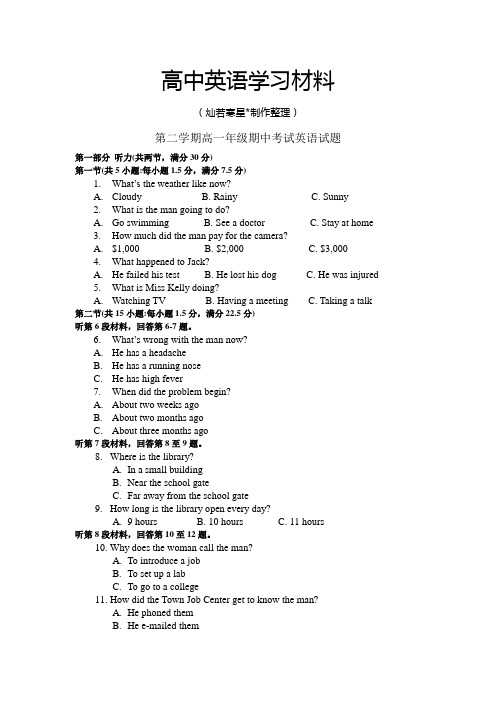
高中英语学习材料(灿若寒星*制作整理)第二学期高一年级期中考试英语试题第一部分听力(共两节,满分30分)第一节(共5小题:每小题1.5分,满分7.5分)1.What’s the weather like now?A.CloudyB. RainyC. Sunny2.What is the man going to do?A.Go swimmingB. See a doctorC. Stay at home3.How much did the man pay for the camera?A.$1,000B. $2,000C. $3,0004.What happened to Jack?A.He failed his testB. He lost his dogC. He was injured5.What is Miss Kelly doing?A.Watching TVB. Having a meetingC. Taking a talk 第二节(共15小题:每小题1.5分,满分22.5分)听第6段材料,回答第6-7题。
6.What’s wrong with the man now?A.He has a headacheB.He has a running noseC.He has high fever7.When did the problem begin?A.About two weeks agoB.About two months agoC.About three months ago听第7段材料,回答第8至9题。
8.Where is the library?A.In a small buildingB.Near the school gateC.Far away from the school gate9.How long is the library open every day?A.9 hoursB. 10 hoursC. 11 hours听第8段材料,回答第10至12题。
人教版高中英语必修三第二学期期中考试(3).docx
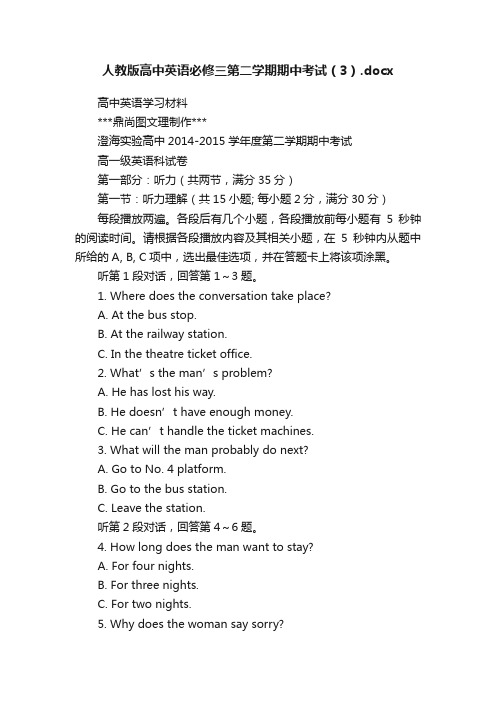
人教版高中英语必修三第二学期期中考试(3).docx高中英语学习材料***鼎尚图文理制作***澄海实验高中2014-2015学年度第二学期期中考试高一级英语科试卷第一部分:听力(共两节,满分35分)第一节:听力理解(共15小题; 每小题2分,满分30分)每段播放两遍。
各段后有几个小题,各段播放前每小题有5秒钟的阅读时间。
请根据各段播放内容及其相关小题,在5秒钟内从题中所给的A, B, C项中,选出最佳选项,并在答题卡上将该项涂黑。
听第1段对话,回答第1~3题。
1. Where does the conversation take place?A. At the bus stop.B. At the railway station.C. In the theatre ticket office.2. What’s the man’s problem?A. He has lost his way.B. He doesn’t have enoug h money.C. He can’t handle the ticket machines.3. What will the man probably do next?A. Go to No. 4 platform.B. Go to the bus station.C. Leave the station.听第2段对话,回答第4~6题。
4. How long does the man want to stay?A. For four nights.B. For three nights.C. For two nights.5. Why does the woman say sorry?A. To apologize for having no room left.B. To apologize for mistaking his room number.C. To apologize for having him waiting.6. Where will the man stay according to the conversation?A. In Golden Hotel.B. In Guangdong Guest Hotel.C. In Guangdong Hotel.听第3段对话,回答第7~9题。
人教版高中英语必修三下学期高一英语期中试卷.docx
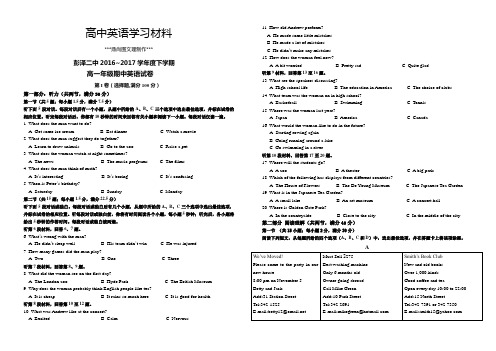
高中英语学习材料***鼎尚图文理制作***彭泽二中2016~2017学年度下学期高一年级期中英语试卷第I卷(选择题,满分100分)第一部分:听力(共两节,满分30分)第一节(共5题;每小题1.5分,满分7.5分)听下面5段对话。
每段对话后有一个小题,从题中所给的A、B、C三个选项中选出最佳选项,并标在试卷的相应位置。
听完每段对话后,你都有10秒钟的时间来回答有关小题和阅读下一小题。
每段对话仅读一遍。
1. What does the man want to do?A. Get some ice cream.B. Eat dinner.C. Watch a movie.2. What does the man suggest they do together?A. Learn to draw animals.B. Go to the zoo.C. Raise a pet.3. What does the woman watch at night sometimes?A. The news.B. The music programs.C. The films.4. What does the man think of math?A. It’s interesting.B. It’s boring.C. It’s confusing.5. When is Peter’s birthday?A. Saturday.B. Sunday.C. Monday.第二节(共15题;每小题1.5分,满分22.5分)听下面5段对话或独白。
每段对话或独白后有几个小题,从题中所给的A、B、C三个选项中选出最佳选项,并标在试卷的相应位置。
听每段对话或独白前,你将有时间阅读各个小题,每小题5秒钟;听完后,各小题将给出5秒钟的作答时间。
每段对话或独白读两遍。
听第6段材料,回答6、7题。
6. What’s wrong with the man?A. He didn’t sleep well.B. His team didn’t win.C. He was injured.7. How many games did the man play?A. Two.B. One.C. Three.听第7段材料,回答第8、9题。
人教版高中英语必修三高一下学期期中考试 (3)

高中英语学习材料(灿若寒星*制作整理)金乡二中11-12学年高一下学期期中考试英语试题第一部分听力(共二节满分30分)第一节(共5小题;每小题1.5分,满分7.5分)听下面5段对话,每段对话后有一个小题,从题中所给的A、B、C三个选项中选出最佳选项,并标在试卷的相应位置。
听完每段对话后,你都有10秒钟的时间来回答有关小题和阅读下一小题。
每段对话仅读一遍。
(请在机读卡上相应番号处将该项涂黑)1.What time is it in Beijing when it’s noon in London?A.Eight in the morning.B. B. Eight in the evening.C. C. Four in the afternoon.2.How are the streets now?A.Long and wide.B. B. Wide and straight.C. C. Straight and clean.3.What do you think Mark can most probably be?A. A teacher.B. A lawyer.C. A policeman.4. Why is the man upset?A. Because he wants to meet the woman’s cousin.B. Because he was not informed of the woman’s holiday.C. Because the woman does not want him to join her.5. What does the man suggest?A. Leaving the house less often at night.B. Buying a new television to save electricity.C. Reducing the power consumption(能量消耗) at home.第二节(共11小题;每小题1.5分,满分16.5分)听下面5段对话。
人教版高中英语必修三-高一下学期期中考试英语试题(word版)
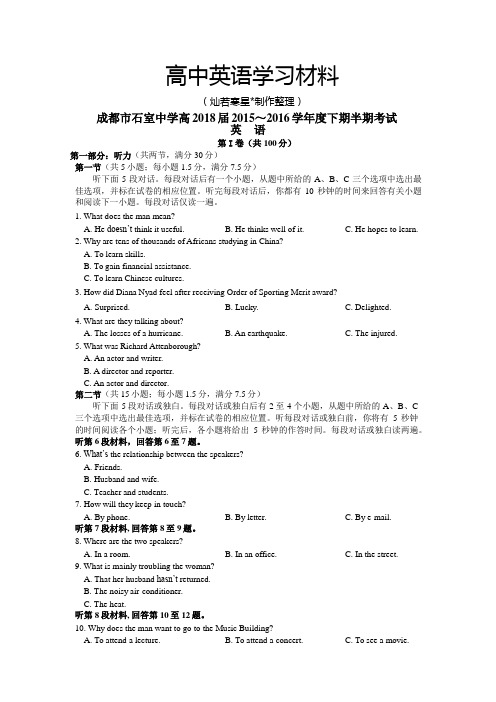
高中英语学习材料(灿若寒星*制作整理)成都市石室中学高2018 届2015~2016 学年度下期半期考试英语第I 卷(共100 分)第一部分:听力(共两节,满分30 分)第一节(共5 小题;每小题1.5 分,满分7.5 分)听下面5 段对话。
每段对话后有一个小题,从题中所给的A、B、C 三个选项中选出最佳选项,并标在试卷的相应位置。
听完每段对话后,你都有10 秒钟的时间来回答有关小题和阅读下一小题。
每段对话仅读一遍。
1.What does the man mean?A.He doesn’t think it useful.B. He thinks well of it.C. He hopes to learn.2.Why are tens of thousands of Africans studying in China?A.To learn skills.B.To gain financial assistance.C.To learn Chinese cultures.3.How did Diana Nyad feel after receiving Order of Sporting Merit award?A.Surprised.B. Lucky.C. Delighted.4.What are they talking about?A.The losses of a hurricane.B. An earthquake.C. The injured.5.What was Richard Attenborough?A.An actor and writer.B.A director and reporter.C.An actor and director.第二节(共15 小题;每小题1.5 分,满分7.5 分)听下面5 段对话或独白。
每段对话或独白后有2 至4 个小题,从题中所给的A、B、C 三个选项中选出最佳选项,并标在试卷的相应位置。
- 1、下载文档前请自行甄别文档内容的完整性,平台不提供额外的编辑、内容补充、找答案等附加服务。
- 2、"仅部分预览"的文档,不可在线预览部分如存在完整性等问题,可反馈申请退款(可完整预览的文档不适用该条件!)。
- 3、如文档侵犯您的权益,请联系客服反馈,我们会尽快为您处理(人工客服工作时间:9:00-18:30)。
高中英语学习材料***鼎尚图文理制作***泉港一中2016~2017学年下学期高一期中考英语试题(考试时间:120分钟总分:150分)本试卷分第Ⅰ卷和第Ⅱ卷两部分,共10页。
第Ⅰ卷第一部分听力(共两节,满分30分)做题时,先将答案标在试卷上,录音内容结束后,你将有两分钟的时间将试卷上的答案转涂到答题卡上。
第一节(共5小题;每小题1.5分,满分7.5分)听下面5段对话。
每段对话后有一个小题,从题中所给的A、B、C三个选项中选出最佳选项,并标在试卷的相应位置。
听完每段对话后,你都有10秒钟的时间来回答有关小题和阅读下一小题。
每段对话仅读一遍。
1.What is the relationship between the speakers?A.A couple.B.Fellow workers.C.Mother and son.2.How does the woman feel about the new house?A.Excited.B.Satisfied.C.Disappointed.3.What are the speakers talking about?A.A room.B.A teacher.C.A course.4.What are the speakers doing?A.Having dinner.B.Buying a table.C.Placing a table.5.Which sport does the woman probably like?A.Basketball.B.Football.C.Baseball.第二节(共15小题;每小题1.5分,满分22.5分)听下面5段对活或独白。
每段对话或独白后有几个小题,从题中所给的A、B、C三个选项中选出最佳选项,并标在试卷的相应位置。
听每段对话或独白前,你将有时间阅读各个小题,每小题5秒钟;听完后,各小题将给出5秒钟的作笞时间。
每段对话或独白读两遍。
听第6段材料,回答第6、7题。
6.Where is the man from?A.America.B.England.C.Australia.7.When will the director meet the man on Monday morning?A.At 8:00.B.At 9:00.C.At 10:00.听第7段材料,回答第第8至10题。
8.Why does the boy want to get cable TV?A.All his friends have had it.B.It is cheap and convenient.C.There are more interesting programs.9.What kind of programs does the boy only watch?A.Action movies.B.Cartoons.cational programs.10.What do we know about the boy?A.He is spoiled by the woman.B.He has to study hard this term.C.He will buy cable TV by himself.听第8段材料,回答第11至13题。
11.Where is the flower show?A.In the City Park.B.In the Forest Park.C.In the Flower Park.12.What did the woman's daughter say about the flower show?A.It's wonderful.B.It's open in the morning.C.It's one of the tourist attractions in her city.13.What can we learn from the conversation?A.The man will go to the flower show.B.The woman has seen the flower show once.C.The woman's daughter went to the flower show yesterday.听第9段材料,回答第14至17题。
14.Whom is the woman talking to?A.Her friend.B.Her son.C.Steve.15.What is the woman's problem?A.She forgot to buy apple pies.B.Her apple pies have gone bad.C.She doesn't know what to have for dessert.16.What does the woman think of Steve's parents?A.Too well-mannered.B.Impolite.C.Easy-going.17.What does the man advise the woman to do?A.Go out to have dinner.B.Buy some fruit and vegetables.C.Prepare fresh fruit and cheese for dessert.听第10段材料,回答第1 7至20题18.What is the prize for the competition?A.A visit to the radio station.B.An air ticket to Europe.C.A trip to Europe.19.What does the speaker say about the story?A.It cannot be fiction.B.It must be over 1,000 words long.C.It can be something that one hasn't experienced.20.When is the closing date for entries?A.October 1st.B.October 15th.C.October 25th.第二部分阅读理解(共两节, 满分40分)第一节(共15小题; 每小题2分, 满分30分)阅读下面短文, 从每题所给的四个选项(A、B、C和D)中, 选出最佳选项。
AFor kids and many adults, a San Diego vacation means theme parks and other attractions. Before heading to a park, call or check its website for updated hours of operation; many parks have seasonal or holiday hours. Ticket prices listed here are for general admission(入场费), single-day use only.Sea World San DiegoA 6-minute ride called Journey to Atlantis, which is to open in late May, tells the legend of the island nation. After the ride of Greek fishing boats, visitors can visit a new exhibit of dolphins, which have not been on display at the park since 1998.DETAILS: General admission is $46.95 for adults, $37.95 for children aged 3-9, free for children 2 and younger. 1-800-380-3203 or www.seaworld. com.San Diego ZooThere’s not much in the way of new attractions. The zoo has a new panda cub(幼兽), Mei Sheng. Nighttime Zoo, a program popular with families, starts June 26.DETAILS: General admission is $21 for adults, $14 for children aged 3-11, free for children 2 and younger. 1-(619)-234-3153 or www. .Maritime(海的) Museum of San DiegoThe HMS Surprise, the 18th-century British warship feature in the film Master and Commander, is on exhibit through Nov. 30.DETAILS: The ship is available for tours from 9 a.m. to 8 p.m. daily. Admission is $8 for adults, $6 for seniors and children aged 13-17, $5 for kids aged 6-12, free for kids 5 and younger. 1-(619)-234-9153 or .Old Town Trolley ToursVisiting relatives or friends in San Diego? They can get a hometown pass and ride for free with your paid admission.Details: The main ticket booth(售票亭) is in Old Town at 4010 Twiggs St. Hours are from 9 am to 5 pm, daily $25. 1-800-380-5203 or www.historictours. com/sandiego.21.The purpose of this text is to _________.A.warnB.amuseC.persuadeD.guide22.If a couple visits San Diego Zoo with their children, one aged 3 and the other 2, the admission will be ____________.A.$35B.$ 49C.$56D.$7023.If you want to get more information about Maritime Museum of San Diego, you should call _____________.A.1-(619)-234-3153B.1-(619)-234-9153C.1-800-380-3203D.1-800-380-5203BMany years ago, there was a great archer(射手)who asked the king to declare him as the greatest archer of the country.The king was about to do so when an old servant of the king said,“Wait,sir.I know an old man who lives in the forest.He is a much greater archer.Let this young man go to him and learn from him for at least three years.”The man could not believe that there could be a greater archer than him,but he went and found the old man was truly much greater than him. For three years he learned from him.Then one day,when he thought he had learned everything,the thought arose in him:“If I kill this old man,then I will be the greatest archer.” The old man had gone to cut wood and he was coming back carrying wood on his shoulder.The young man hid behind a tree,waiting to kill him.He shot an arrow.The old man took a small piece of wood and threw it.It struck the arrow and the arrow turned back and wounded the young man.The old mancame,took out the arrow and said, “I knew that some day or other you were going to do this.That’s why I have not taught you this secret.There is no need to kill me.My Master is still alive,and I’m nothing before him.You must be with him for at least thirty years.And he is very old, so go fast! Find the old man!”24. The underlined word in the 1st paragraph is closest in meaning to .A.admireB.adviseC.announceD.admit25. What do you think would most probably happen next?A.The young archer died from the wound soon after.B.The king declared the young man the greatest archer.C.The young archer found the old man’s master and killed him.D.The young archer set off to look for the old man’s master.26. The young archer wanted to kill the old man for the reason that _______.A.He had nothing more to learn from himB.He could then become the greatest archerC.The old man refused to teach him everythingD.The king’s old servant ordered him to do so.27. What lesson can you learn from the story?A.There’s always someone better than you in this world.B.You must never try to become better than your teacher.C.The older a man is,the better archer he usually becomes.D.Always use a piece of wood to protect yourself from an arrow.CSometimes having a teenager at home can be a real headache. Many teenagers smoke, drink, wear strange hairs and even fight. Basically, they are often taking risks.Earlier studies have shown that teenagers are more likely to make irrational decisions than people from any other age group, including children and adults. Is it that teenagers are too young to tell right from wrong? Not really. So what explains their risky behavior?According to Laurence Steinberg, a professor at Temple University, US, that is because teens care a lot about how their peers (同龄人) view them –that’s the effect of “peer influence”, reported Science Daily.As children enter their teenage years, they spend more time with their friends and classmates and also become more sensitive to their feedback (反馈). This sensitivity drives teenagers to focus on the short-termbenefits of making risky choices and overlook the costs.In a test, a group of teenagers were asked to play a video driving game. When they played with their friends watching, they took more chances and drove more carelessly because that would increase their possibility of winning. But when they played alone, they tended to drive more safely.Why does pressure from peers have such a big influence on teens’ behavior?As Steinberg sees it, a teenager’s brain is like a car with a good accelerator (油门) but a weak brake (刹车). The “accelerator”, the brain’s ability to notice the benefits of things, is fully developed by teenage years while the “brake”, the brain part related to controlling impulses (冲动) and long-term thinking, is still not mature (成熟的). When teens are under the pressure of being judged by their peers, they tend to push hard on the accelerator. Given how weak the brake is, it is likely that they are going to end up in a crash.But the good news here, according to Steinberg, is that a violent teenager doesn’t necessarily become a violent adult. About two-thirds to three-quarters of violent youth grow out of it. “They get more self-controlled,” Steinberg told Live Science. Also, people who haven’t committed a violent crime by age 19 are less likely to start doing it later, added Steinberg.28.The underlined word “irrational” in the second paragraph is closest in meaning to ______.A.crazyB.quickC.carefulD.independent29.Why are teenagers likely to take risks according to the text?A.They are too young to tell right from wrong.B.They are eager to challenge themselves.C.They care a lot about what their peers think of them.D.Their brains are more sensitive to thrilling events.30.How does Steinberg explain the influence of peer pressure on teens’ behavior?A.By performing an in-depth analysis.B.By giving examples.C.By using a metaphor (比喻).D.By presenting research findings.31.What can we conclude from the text?A.Those who love taking risks are more likely to commit violent crimes.B.The majority of teenagers become less violent when they grow up.C.Violent teenagers often grow to be adults who cannot control themselves well.D.People who are over 19 years old are less likely to commit a crime than teenagers.DThe more we do a thing, the more we tend to like doing it; and if we do not continue to do it, we feel uncomfortable. This is called the force of habits, and the force of habits should be fought against. Habits, whether good or bad, are gradually formed. When a person does a certain thing, he is driven by some unseen force to do the same thing repeatedly; then a habit is formed. Once a habit is formed, it is difficult, and sometimes impossible, to get rid of. It is therefore very important that we should pay great attention to the formation of habits. Children often form bad habits, some of which remain with them as long as they live. Older persons also form bad habits as long as they live, and sometimes become ruined by them.There are other habits which, when formed in early life, are of great help. Many successful men say that much of their success has something to do with certain habits in early life, such as early rising, honesty and so on.Among the habits which children should not form are laziness, lying, stealing and so on. They are all easily formed habits. Unfortunately, older persons often form bad habits, which should have been avoided.We should keep from all these bad habits, and try to form such habits as will be good for others and ourselves. Remember: Habits cure habits.32.Generally speaking, it is difficult for one to __________.A.form bad habits and easy for him to form good habitsB.get rid of good habits and bad habits once formedC.get rid of bad habits and easy for him to form good habitsD.get rid of good habits and easy for him to form bad habits33.We should pay much attention to the formation of habits because __________.A.habits are of great help to everyone of usB.a man can never get rid of the bad habitsC.we are forced to do them repeatedlyD.it’s hard and even not possible to get them away34.__________ are formed little by little.A.Good habitsB.Bad habitsC.Both good habits and bad habitsD.Neither good habits nor bad habits35.According to the passage, early rising or honesty ____________.A.is such a habit as should not have been got rid ofB.is an early formed habit that is with one as long as he livesC.is such a habit as will be kept fromD.is a habit that has something to do with success第二节(共5小题; 每小题2分, 满分10 分)根据短文内容, 从短文后的选项中选出能填入空白处的最佳选项。
